The National Weather Service has predicted a wetter, warmer winter for much of the United States, but in Arkansas, the weather is expected to be as unpredictable as ever, local forecasters said.
"We’re not favored to swing one way or another, but a huge part of the country is," said Tabitha Clarke, a meteorologist at the National Weather Service in North Little Rock. "We’re on the fringe — equal chance for above-average and normal temperatures."
Warmer-than-normal conditions are most likely to occur in the regions north and west of Arkansas, with no part of the United States expected to have below-average temperatures, according to the weather service.
Throughout the winter season, which lasts from December to February, temperatures in Arkansas typically hover in the low 40s, Clarke said, adding that above-average temperatures might climb into the mid-40s and upper 50s.
National forecasters also predicted more precipitation in the southern portion of the United States, particularly in the region below Arkansas.

Arkansas has had a wetter-than-normal fall, with about 4 to 7 inches dropping across the state in September. Some areas received up to 15 inches in flash-flooding situations that more than quadrupled the monthly average of 3 inches, according to figures from the weather service.
Wet weather is expected to continue into winter as fronts with chances of rain move into the area, Clarke said. As a result, warm temperatures and precipitation will be more likely to occur at the beginning of winter, rather than in January or February, she said.
The weather service's prediction of wet weather pertains primarily to rainfall and does not take into account snow or ice forecasts. Arkansas receives, on average, about 1.5 inches of snow in January and February each year, but Clarke said there is no indication that it would be heavier than normal this year.
